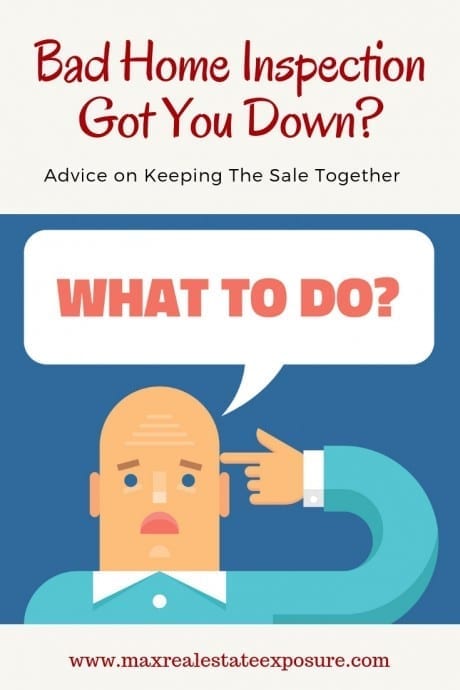Failed Home Inspection = Back on Market.
 Is your house returning to the market due to the buyer’s home inspection?
Is your house returning to the market due to the buyer’s home inspection?
Sellers often ask real estate agents how often buyers back out after a home inspection.
Looking at the process of selling a home, there is nothing more frustrating than putting a house back on the market due to a failed home inspection.
The frustration is exacerbated even further when a buyer backs out because of minor issues.
There are few situations that real estate agents want to deal with than having to put a home back on the market because a sale falls through. Unfortunately, it does happen.
You may be shocked by this roadblock or have suspected something like this would happen. Either way, you are still in the unenviable position of re-listing the home.
If you are worried about putting the home back on the market because it will look alarming to buyers, you have good reason to be.
Buyers and their agents will look more closely than ever at a home that has been re-listed.
Don’t Make The Same Mistake Twice
It would help if you were prepared for this extra scrutiny by going over the home with a fine-toothed comb and consulting with your Realtor to make sure you won’t run into the same problem a second time.
Fixing problems a home inspector has discovered is often advisable to do.
You can expect your real estate agent to be questioned by a buyer’s agent for the reason the home has come back on the market. Real Estate agents, by law, have to be completely honest with future buyers.
For example, it must be disclosed if your home is back on the market due to the home inspection. If the buyer has said they backed out because of X, Y, and Z, you must let future buyers know these issues exist.
Unless, of course, you don’t mind being sued.
How Often Do Buyers Back Out After a Home Inspection?
Over the years, many sellers have asked me how often a home inspection kills a deal.
On a percentage basis, far more homes go through the inspection process successfully than those that don’t.
Although it can be disheartening to find yourself re-listing your home, don’t lose heart. Many sellers experience something similar; most can list their homes again and get them under contract.
Pay attention, do your due diligence, and work closely with your agent to ensure you are successful.
Read on to learn about what happens when you put a home back on the market, how to avoid inspection issues, and how to prepare to list your home once again.
How Long Does a Buyer Have to Back Out After an Inspection?
Home buyers have until the conclusion of the inspection contingency period to reconsider their purchase or otherwise forfeit their earnest money deposit.
When buyers don’t respond by the agreed-upon contract time frame, it is assumed they are moving forward with the sale.
A buyer could still opt to back out after a home inspection contingency has passed. However, they would violate the contract. In this circumstance, a seller could keep their earnest deposit funds.
If the inspection contingency expires, a buyer’s funds are at risk.
Remember—Listing the Home Again May Attract Negative Attention
 It is not something any seller wants to hear, but it is worth mentioning anyway. A home that is listed again can become stigmatized.
It is not something any seller wants to hear, but it is worth mentioning anyway. A home that is listed again can become stigmatized.
Although this is unpleasant news, it is better to know than to move forward blindly and assume there won’t be any problems.
Buyers and agents will often notice that you have re-listed the home. They will ask questions, first among themselves and then if and when they talk to you about the house.
These potential buyers will assume there must be something seriously wrong with the house if it had to be taken off the market and then listed again.
If nothing else, the buyer’s agent will certainly contact your listing agent and inquire about what went wrong.
Most buyers will be skeptical about your home once you list it again. It would be best if you were prepared for this skepticism by ensuring you can address all concerns in the best way possible.
Have a Game Plan Moving Forward
Your preparations must include asking yourself the questions they are sure to ask and coming up with acceptable answers.
You will also need to make the repairs required to pass the next inspection or have an excellent reason why you cannot make the repairs and be prepared to lose money in the process.
When I counsel seller clients on what should be repaired and what shouldn’t, there is always a test of reasonableness. You should ask yourself if the next buyer will likely have the same concerns as the first buyer.
Trust me; some buyers are clueless. They lose sight of the home inspection’s purpose, which is to find major structural or mechanical defects.
The purpose of a home inspection isn’t to present the owner with a punch list to make the home perfect. If this is the buyer, you must toss them to the curb. Unreasonable buyer requests after an inspection are not unusual.
On the other hand, if the buyer asks you for reasonable repairs, it is almost always in your best interests to do them. Time is money.
Don’t Let Emotions Get The Best of You
In my thirty-seven years of selling real estate, sellers’ worst decisions have centered around home inspections. Homeowners can be their own worst enemies if you let them!
If you have just sold your home over asking in a bidding war by 20,000, and the buyers ask for $2000 off the price to fix a legitimate issue – DO IT! Unfortunately, being thick-headed can kill home sales.
Don’t cut off your nose to spite your face is an excellent saying in this situation. Some sellers don’t understand how they might lose 20,000 or more instead of taking $2000 off the price.
It would not be unusual for a seller to put their home back on the market and find the next buyer who won’t even pay the asking price.
Sometimes people make horrible decisions because their emotions get the better of them. A few years ago, I sold a home in Westborough, Massachusetts, where the seller almost killed a deal after selling his home for $15,000 over asking.
He didn’t want to do anything after the home inspection, even though any buyer would want some legitimate issues to be fixed. Don’t be this kind of seller!
Prevention is Ideal—Do What You Can to Avoid Inspection Problems in the First Place
If you are reading this, chances are your home has failed an inspection, and you need to re-list. But if you are fortunate enough to be doing your homework ahead of time to avoid such a problem, there are some things you can do to protect yourself that you should know about.
These include:
Get an Inspection Before You List Your Home.
 Most sellers are hesitant to spend money when they don’t feel like they have to, so they balk at getting a home inspection before selling. You should know that avoiding a pre-listing inspection is penny-wise and pound-foolish.
Most sellers are hesitant to spend money when they don’t feel like they have to, so they balk at getting a home inspection before selling. You should know that avoiding a pre-listing inspection is penny-wise and pound-foolish.
A pre-listing inspection does cost some money, but it will also tell you everything that the post-listing examination will find—all the issues that could cause your sale to fall through.
In the grand scheme, the home inspection cost is well worth the money.
Why not spend a little money now to learn this priceless information and avoid the need to re-list in the first place? At the very least, if you’re not going to hire a professional, you should do some home inspection preparation for problems you know to exist.
Doing so is just plain smart.
Make All The Repairs Before You List The Home and Document Them.
Hiring a professional home inspector will uncover more things a layperson would never know. Your pre-listing inspection gives you a checklist of things that must be taken care of before you sell the home.
Take this list to heart and talk carefully with your Realtor about what needs to be done and what can be left undone.
You may not want to spend more on repairs—which is understandable. But some repairs must be done to have a successful sale.
Your agent can help you determine what repairs are vital and which are unlikely to make a significant difference during the sale.
That way, you can spend only what you must and save yourself the worry of a destructive inspection before closing the deal.
Disclose All Significant Issues Ahead of Time.
Whatever substantial problems you have with your home—and whatever repairs you cannot or do not make that will be of concern to buyers—are things you need to disclose right out the gate. The home inspector will discover these issues anyway, so you might as well be honest about them.
Disclosure has the added benefit of letting buyers know what they are getting into before making an offer, making them less likely to back out on the deal when the home inspector identifies the issues.
After a home inspection, renegotiation is much harder for a buyer when you have disclosed the problems upfront.
Your real estate agent should ensure the buyer sees any real estate disclosures before submitting an offer.
What to Do if you Have to List Your Home Again
Understanding how to prevent buyers from backing out of an inspection a second time is essential.
So the home inspection went south, and the buyers ran off. It is not ideal, certainly, but it is also not the end of the world. You can re-list, and you can sell it.
Just make sure to pay attention to the following:
 1. Learn the Disclosure Laws in Your State.
1. Learn the Disclosure Laws in Your State.
Your state may require you to disclose certain information when selling a house. More than likely, your real estate agent must communicate issues discovered during an inspection.
You don’t want to risk breaking the law, so do your research and make sure you are adhering to the law.
2. Talk to Your Realtor.
Your agent has probably dealt with a situation similar to yours before. They will know what to do next to avoid a similar outcome in the future. Ask for advice, and do your best to follow that advice.
Your agent should tell you the market conditions and how future buyers will react to the problems discovered during the inspection.
3. Make the Repairs if You Can.
The surest way to avoid a failed deal moving forward is to make the repairs indicated by the inspector. Get them taken care of so you can re-list with confidence.
Many people think “selling as is” is how they should proceed. WRONG! That is the worst thing you can do. Nobody wants your problems.
4. Get a Professional Opinion.
Home inspectors can be wrong about an issue, such as roof replacement. The inspector may say the roof must be replaced. But if you bring out a roofing professional, you may discover that you have several years left on the roof.
Just like any other profession, there can be human error. Just because a home inspector says something doesn’t mean it is the gospel. Far from it! From personal experience, I have seen numerous home inspectors make mistakes.
Human error and exaggeration are reasons I always tell anyone willing to listen that the listing agent must attend the home inspection! You are paying your real estate agent a lot of money. It makes sense that they should be there hearing precisely what comes out of the inspector’s mouth.
Trust me, at least half the time, inspection items are misconstrued or exaggerated by the buyer. Home inspection reports often sound way worse than the actual problem. After all, the inspector is covering their ass.
5. Be Honest With Disclosing Home Inspection Problems.
Honesty is your friend. Of course, you don’t have to spill out every little detail. Ask your agent how to best respond to likely buyer questions.
Ensure you and your agent are not holding back information that could influence a buyer’s decision to purchase your home. Doing so could lead to a lawsuit.
What Issues Discovered Should Be Fixed?
While there are no mandatory fixes for home sellers, there can be legitimate buyer requests.
One of the questions sellers will ask their real estate agent after a failed inspection is what should be fixed. Here are some examples of things that should be corrected.
You don’t want history to repeat itself. It is reasonable to assume that most buyers would want these things fixed.
- Any structural defect, such as a rotted sill or column in the home.
- A roof that is past its life expectancy.
- A heating system/water tank that is leaking and clearly past its life expectancy.
- An electrical problem that is a safety hazard.
- A plumbing defect such as a leak.
- Mold found anywhere in the home.
- Radon was above the suggested EPA requirement of 4 pCi/L.
- Loose asbestos that could pose a health risk.
- A well that is not producing an adequate amount of water.
- Termite damage/infestation.
There will always be gray areas of what should be fixed and others that aren’t that big a deal. The perfect example is an inspector calling out the need for GFCI breakers in a kitchen and bathroom.
Is this code in today’s homes – yes. Did GFCI breakers not exist for centuries – yes! When buying a home, should a buyer sweat a detail like this – NO!
Final Thoughts on Buyers Backing Out After an Inspection
If you need to put your home back on the market, do what’s necessary to prevent history from repeating itself. Two failed inspections back to back are the kiss of death. Selling your home will be that much harder!
Hopefully, you have found this home inspection guide helpful in making sound decisions. The goal should be preventing a buyer from backing out after an inspection.
Additional Helpful Home Selling Articles
- Problems an inspector may miss – did you know a home inspector can’t discover every situation with a house? Remember that a home inspector is only at the property for a short time. Inspectors are human, just like the rest of us. See the issues a home inspector might not be able to find on the day of the inspection.
- What happens when a buyer defaults – see what happens in a real estate transaction when a buyer does not live up to their agreed-upon obligations.
- An escrow holdback for uncompleted work – when selling a home, the inspection might reveal problems that need to be rectified. Sometimes these issues can not be corrected before the closing. When this happens, an escrow holdback becomes necessary. See what you need to know about holdbacks.
- Open houses bring the wrong people through your door – learn why open houses are unnecessary to sell a home and put a seller’s home at risk of theft.
The above home-selling resources will help ensure you make the best real estate decisions.
About the author: The above Real Estate information on how often do buyers back out after inspection was provided by Bill Gassett, a Nationally recognized leader in his field. Bill can be reached via email at billgassett@remaxexec.com or by phone at 508-625-0191. Bill has helped people move in and out of many Metrowest towns for the last 37+ Years.
Are you thinking of selling your home? I am passionate about real estate and love sharing my marketing expertise!
I service Real Estate Sales in the following Metrowest MA towns: Ashland, Bellingham, Douglas, Framingham, Franklin, Grafton, Holliston, Hopkinton, Hopedale, Medway, Mendon, Milford, Millbury, Millville, Northborough, Northbridge, Shrewsbury, Southborough, Sutton, Wayland, Westborough, Whitinsville, Worcester, Upton, and Uxbridge MA.


 1. Learn the Disclosure Laws in Your State.
1. Learn the Disclosure Laws in Your State.